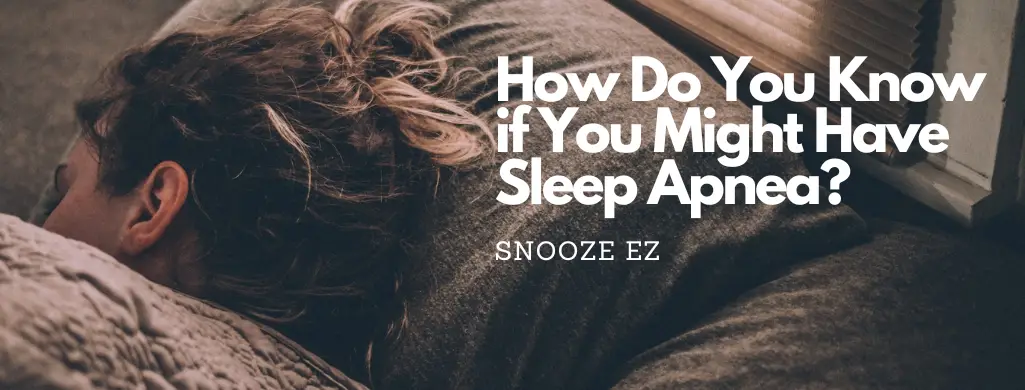So, how do you know if you might have sleep apnea?
Sleep apnea is a common sleeping disorder that affects people of all ages. The most common symptom is snoring, but it can also cause pauses in breathing and choking sensations during sleep. If left untreated, sleep apnea can lead to more serious health issues such as heart disease, stroke and high blood pressure.
If you’re concerned that you may have this disorder, there are some signs and symptoms to look out for. I’m Aaron, sleep expert. In this article, we will discuss how to recognize the signs of sleep apnea and what you should do if you think you may have it.
Identifying Signs of Sleep Apnea Without a Sleep Study
Snoring Loudly
The most common symptom of sleep apnea is very loud snoring at night, sometimes accompanied by pauses in breathing. If a loved one has noticed that your snoring is especially loud for a sustained period of time, then this could be a sign of sleep apnea.
Waking Up Feeling Breathless/Run-down
If sleep apnea is disrupting your breathing during the night, then chances are your body won’t be getting enough oxygen while sleeping. This can lead to feelings of fatigue, dizziness and breathlessness upon waking.
Additionally, due to the disruption of a normal sleep pattern, those suffering from sleep apnea can experience significant tiredness throughout their day as well as poor concentration levels and an inability to stay awake for extended periods of time.
Waking Up with a Dry Mouth or Sore Throat
If you wake up with a dry mouth or sore throat, this could mean that airways have become blocked during the night due to the soft tissues at the back of the throat collapsing against themselves – leading to an increased effort from your body when trying to draw breath from an obstructed airway.
High Blood Pressure
High blood pressure and headaches are two symptoms which should always be monitored as indicators for potential heart disease risks – especially if they occur regularly over time. These can both result from lack of oxygen flowing through the body as we try harder and harder in order to breathe deep enough during our disrupted sleep cycles.
Waking Numerous Times During Sleep
If you find yourself waking up numerous times throughout the night for no reason at all or feeling like certain parts of your body have gone numb temporarily, then this could be a sign that your brain isn’t receiving sufficient oxygen during nighttime hours – an indication of possible obstructive sleep apnea (OSA).
Excessive Daytime Fatigue and Risky Behaviors
Daytime fatigue can also present itself in other forms such as excessive irritability or impulsivity throughout waking hours. Do you ever take small naps throughout the day? This could indicate that you’re not getting enough quality rest overnight due to interrupted breathing throughout the night.
In worst case scenarios this can lead to risky behaviors such as suicidal thoughts or drug/alcohol abuse due to ongoing exhaustion/sleep deprivation occurring on a regular basis over extended periods.
Irritable
This one speaks for itself. You may recognize that you are more irritable than usual. Easily having feelings of agitation, annoyance, and frustration are some signs.This, of course, is a result of not getting adequate sleep.
Fit the Criteria
Certain people are more susceptible to obstructive sleep apnea, especially males; the risk for women increases after menopause. Your chances also increase after the age of 40. Furthermore, being overweight or obese will drastically raise the chance of developing sleep apnea. If you drink alcohol, especially before bed, this can also increase your risks. Also, look into your family history. If others have suffered, then you may as well.
What You Should Do
First, if you are fairly sure the symptoms of sleep apnea above fit you, then go see your family doctor. He/she can refer you to a sleep specialist and get a sleep study set up for you. If you are not sure and do not want to go see your doctor just yet, then you can rule out the most common, tall-tail, symptom of snoring yourself.
The easiest way would be recording yourself while you sleep. You could do this with your phone by using a voice recorder app or video cam. The other way is have your partner or someone check on you while you sleep.
Whatever you decide to do, don’t put it off. Sleep apnea is not something to put-off. It can shorten your life tremendously. Though, if treated, you can live a long, normal, healthy life.


